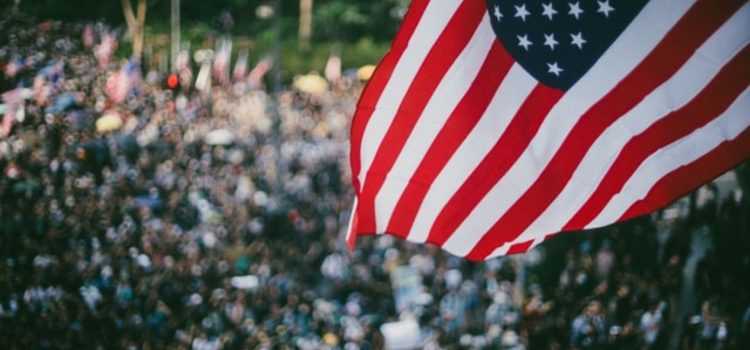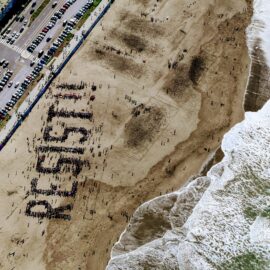

This article is an excerpt from the Shortform book guide to "A Warning" by Anonymous. Shortform has the world's best summaries and analyses of books you should be reading.
Like this article? Sign up for a free trial here .
Did Donald Trump put democracy at risk? What were the implications of his relentless yet indirect assaults on the democratic system? How did Trump’s rule compromise democracy?
In his business and personal life, Trump always treated competitors and challengers as enemies to be eliminated—an attitude that carried over into the White House. This attitude was antithetical to the ideals of democracy.
Let’s take a look at how Donald Trump challenged the democratic system of the United States.
Donald Trump: A Risk to the American Democracy?
Besides destroying the Republican Party, Donald Trump undermines democracy. Every American, no matter what his or her politics are, should be alarmed.
After the election, Trump began considering ways to use federal investigators—in his mind, they’re his investigators—to punish his political opponents, especially the Clintons. While most people shrug off his threats as jokes or hyperbole, Trump really believes he can prosecute and jail anyone who challenges him. He’s furious when his lawyers and the law don’t bend his way. He’s been especially upset that the Justice Department hasn’t persecuted the Clintons.
He styles his improper demands as hints or innocent suggestions that he can deny later if necessary. For instance, he suggests that while he could order someone to do something, he hopes he won’t have to. His appointee knows exactly what Trump wants him to do. Attorney General Jeff Sessions ignored Trump’s signals to investigate the Clintons, which was a factor in his firing. Trump soon began sending the same signals to his new attorney general, Bill Barr.
Our nation’s founders designed a system of checks and balances to deter such presidential abuses of power. The Trump presidency is proving to be one of the system’s biggest tests. He has undermined and attacked all three branches of government.
Attacking Civil Servants
Trump launched an immediate offensive against government employees, the civil servants who carry of the daily work of government under Republican and Democratic presidents alike. They ensure that laws and policies are applied as intended, not abused for political purposes.
To Trump, however, civil servants constitute a Deep State trying to thwart and destroy his presidency. What Trump really fears is that they’ll expose his incompetence or self-serving actions. Trump’s flunkies and his promoters on cable television echo the Deep State fantasy to curry favor with him and his base. In reality, members of the Deep State are people Trump doesn’t like.
The idea of a traitorous Deep State has permeated the administration. Public servants in the executive branch may be cut out of the loop on suspicion of being disloyal. Meetings are designated as being for “politicals only,” or restricted to presidential appointees. Sometimes they take place in the secure Situation Room to prevent civil servants from overhearing anything.
Among the problems with the Deep State obsession are the following:
- The only information Trump gets comes from inexperienced political appointees, whom he deems loyal, and who typically agree with him.
- Civil servants, particularly those who question the president’s agenda, aren’t being allowed to do their jobs. As a result, expert opinions are marginalized—for example, scientists studying the effects of climate change or health experts concerned about harmful effects of environmental deregulation.
- The government and administration are suffering from a brain drain, leaving agencies staffed by skeleton crews of partisans. Issues are ignored or become crises because no one knows what they’re doing.
Attacking Intelligence
Employees in the U.S. intelligence community, including the Central Intelligence Agency and National Security, are critical to our safety and security, yet they’re among Trump’s most frequent targets.
Even before taking office, Trump resented their conclusion that Russians were interfering in the election campaign to benefit him. Once elected, Trump continued to ridicule intelligence assessments and dismiss the agencies as political hacks or part of an Obama conspiracy.
What’s worse, Trump has handled sensitive information recklessly. For example, Trump tweeted a photo of a failed Iranian missile launch in the summer of 2019 to taunt the Iranian government. But the photo, from a U.S. spy satellite, had been shown to Trump at a classified meeting. Before long, online hackers identified the satellite.
Trump frequently politicizes intelligence. He expects it to support his agenda—he thinks
intelligence officials should be loyal to his agenda rather than honest. For example, Trump was furious when top intelligence officials told the Senate in January 2019 that ISIS hadn’t been defeated and that North Korea wasn’t likely to give up its nuclear weapons. Trump excoriated them on Twitter, then called them to his office and had a photo taken, making it look as though they’d come to repent. He released it with a claim that they’d been misquoted. A few months later, Trump fired the director of national intelligence, Dan Coats, and his deputy for not toeing his political line.
Claiming the intelligence agencies had “run amok,” he finally succeeded in pressuring the Justice Department under Bill Barr to investigate the intelligence community and its findings about Russia and the 2016 election.
However, Trump may not be as in control as he thinks he is: an intelligence community whistleblower’s complaint soon launched an impeachment inquiry into Trump’s effort to strongarm the Ukrainian government into investigating a 2020 political opponent, Joe Biden, and his family.
Judicial System in the Crosshairs
Our Judicial system is divided between the executive branch, which investigates and prosecutes crimes, and the courts, which determine guilt or innocence. Trump has worked to undermine both branches. Besides attacking his own defense lawyers, he pressures those investigating him and attacks judges in an effort to get favorable decisions.
He tries to force his lawyers to say what he wants to hear, pushing them to the edge of what’s legal until they go beyond it. When he’s about to ask his lawyers to do something inappropriate, he checks for note-takers in the room. For example, he once shouted at an aide who was taking notes: “What the f-ck are you doing? Are you f—ing taking notes?” The aide apologized and stopped.
Former White House counsel Don McGahn had the courage to oppose him. However, when those around don’t do what he wants, Trump turns to less scrupulous outside lawyers like Michael Cohen and Rudy Giuliani.
In addition to attacking lawyers and investigators, Trump demeans and undermines judges who rule against him:
- During the 2016 campaign, Trump attacked a judge who ruled in a lawsuit against Trump University. He claimed the judge was biased because he was from Mexico. (The judge was born in Indiana.)
- Trump also blasted an immigration ruling and attacked the judge, suggesting he was unfair and an “Obama judge.” He said the court should be investigated. Chief Justice John Roberts denounced Trump’s attack, affirming the value of an independent judiciary. However, Trump derided the concept on Twitter and, in subsequent rants, invited others to join him in vilifying the courts
- Trump has proposed eliminating judges: “Let’s get rid of the f—ing judges. There shouldn’t be any at all, really.” He demanded that aides draw up a bill to cut the number of federal judges, a request they ignored.
Such statements and actions indicate that Trump feels he is above the law. Another indication is his preoccupation with the president’s power to pardon convicted criminals. He’s told appointees that if they break the law at his request, he’ll pardon them. For example, he advised those working on his border wall that he’d pardon them if they got into trouble for ignoring regulations. When the comment leaked, aides said he was joking. Trump has even argued that he can pardon himself. Does his obsession with pardons suggest he intends to follow the law?
The Mueller Investigation
The idea of being investigated sends Trump into orbit. Trump fired FBI Director James Comey on May 9, 2017, in what looked like an effort to protect himself from investigation, although he claimed Comey had lost the public’s trust. Later, Trump changed his story and publicly cited the Russia probe as one of the reasons. Aides worried these moves would bring down his administration.
The Justice Department’s second in command, Rod Rosenstein, decided on May 19 to launch an independent investigation into Russian interference and appointed former FBI director Robert Mueller as special counsel. Trump immediately began looking for ways to oust Mueller. He told White House counsel McGahn to fire Mueller, but McGahn refused multiple requests on the grounds it could be considered obstruction of justice. When the media learned of Trump’s demand, he requested that McGahn lie about it; again, McGahn refused.
Mueller’s report on his Russia investigation cited Trump’s public attacks on the probe as a “witch hunt,” his efforts to control it, and his pressure on witnesses to not cooperate. Hundreds of former federal prosecutors signed a letter decrying Trump’s efforts to derail the investigation as obstruction of justice. If he weren’t president, they said, he’d face “multiple felony charges.”
Attacking the FBI
The FBI has been one of the most unfortunate victims of Trump’s efforts to vilify investigators. Like other public servants, FBI agents want to serve their country and learn the truth. Yet Trump constantly attacks them as “crooked,” “political actors,” “dishonest,” and the “worst in history.” He claims the FBI is a center for the Deep State.
Unfortunately, not many of those surrounding Trump have objected to these attacks and told him to stop. Trump has encouraged the public to disbelieve our top law enforcement agency and believe his conspiracy theories instead.
Attacking Congress
It’s also the role of Congress to act as a check on the president. But Trump finds it intolerable that congressional committees have the authority to oversee federal agencies.
Trump has told appointees to ignore or defy rules that require them to work with Congress. For instance, instead of giving Congress advance notice before proceeding on weapons sales (to Saudi Arabia), Trump invoked an emergency provision, so he could inform Congress only at the last minute and proceed as he wished.
Rather than send nominations for key positions to the Senate for “advice and consent” as the Constitution requires, Trump appoints people to serve in “acting” capacities without approval. Because of their tenuous status, they’re inclined to accede to his wishes without question.
Impeding Congressional Investigations
The president actively impeded congressional inquiries. He has instructed lawyers and appointees to ignore subpoenas or oppose them on the grounds of executive privilege (which is supposed to be restricted to the disclosure of confidential information).
This has been a deliberate strategy to block congressional oversight since Democrats won control of Congress in the midterm elections, although this stance makes it difficult for aides to promote Trump’s policies on Capitol Hill. Of course, when they won a majority, House Democrats intended to use investigations to bring Trump down. Several current investigations are clearly political rather than substantive. However, others fall within Congress’s watchdog role—for instance, investigating whether ethics were violated or actions were taken for political reasons.
Under our democratic system, the White House doesn’t decide what Congress investigates. One of its constitutional roles as a “co-equal” branch of government is to act as a check on the president. By fighting this, Trump is setting a precedent “for future government malpractice.”
Digging Up Dirt on Opponents
Besides attacking all three branches of government, Trump uses the powers of office for political purposes. He fails to differentiate between normal politics and brazen corruption. For instance, he told ABC’s George Stephanopoulos that he’d consider accepting dirt on a political opponent from a foreign government like China or Russia.
Just a few months later, Trump decided to use the power of his office to coerce Ukraine to investigate Democratic presidential candidate Biden and his son, Hunter. The latter was paid to serve on the board of a Ukrainian gas company, while Biden was involved in U.S. policy toward Ukraine while serving as vice president.
The proper way to investigate any potential crimes would have been through the Justice Department—American presidents don’t ask foreign leaders to investigate political rivals as a “favor.”
Members of the Steady State, “who have seen these sorts of reckless actions again and again, wanted to slam our heads against the wall.” It was clear Trump hadn’t learned anything from the Mueller investigation, but members of the Steady State learned he would abuse any power at his disposal. The upshot was that “No external force can ameliorate his attraction to wrongdoing.”
Attracted to Wrongdoing
An example of Trump’s attraction to wrongdoing is his repeated efforts to punish what he calls “Democratic states”—those where a majority voted for Clinton in 2016. Despite the fact that he also has supporters living in those states, he constantly looks for ways to make residents’ lives difficult.
There’s no state Trump hates more than California, which he believes “stole” electoral votes from him by allowing supposedly illegal immigrants to vote. In retaliation, Trump wanted to cut off federal disaster assistance when wildfires took lives and property, although aides didn’t act on it. Trump also targeted California in other ways:
- He revoked the state’s tailpipe emissions waiver, which allowed it to set higher limits than the federal government to reduce pollution from vehicles.
- He took steps to cut funding for high-speed rail projects.
- He threatened to dump immigrants arriving at the Mexican border in California.
These threats and actions deserve scrutiny if Congress wants to investigate abuse of power by the president for political reasons.

———End of Preview———
Like what you just read? Read the rest of the world's best book summary and analysis of Anonymous's "A Warning" at Shortform .
Here's what you'll find in our full A Warning summary :
- An inside look at the chaotic Trump administration written by a senior Trump administration official
- An examination of Trump's authoritarianism and threats to democracy
- The three options that existed for removing Trump from office






